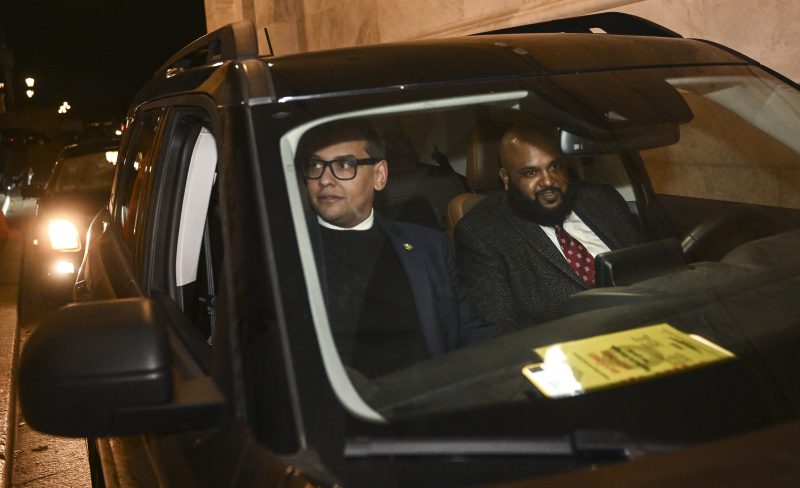In George Santos’s quest to stay in Congress, the problem that’s loomed largest has been his potential financial improprieties. Lying about your personal and professional background is unequivocally bad, but things could become untenable for Santos, and for GOP leaders, is if there is credible evidence that he committed a crime. That seems to be House Speaker Kevin McCarthy’s (R-Calif.) red line, anyway.
And at the very top of the list of Santos’s legal liabilities are the questions surrounding how a guy who clearly had financial struggles as recently as during his failed 2020 campaign apparently could suddenly pump $700,000 of his own money into his successful 2022 congressional bid.
Santos has changed his story on that front, albeit only slightly and perhaps unintentionally. But it still doesn’t make much sense or track with his previous explanations.
The change came on Tuesday night when Santos’s campaign amended the congressman’s campaign finance filings. The most notable change: He unchecked a box that stated loans of $500,000 and $125,000 were “personal funds of the candidate.”
Some have seized on the amended filings to suggest Santos is now saying the money didn’t actually come from his own funds, raising questions about precisely where it came from.
But the source of the loans is still listed as “DEVOLDER SANTOS, GEORGE, ANTHONY.” It’s also not clear how claiming the loans came from elsewhere would help him.
Just as notably, $500,000 of the funds are still listed as “personal funds of the candidates” in newly amended filings for other periods, which suggests it’s quite possible this is just a clerical error. These filings also unchecked a box declaring the loan was for the primary portion of the campaign, erased the election year the loan was for and erased the interest rate (which elsewhere was listed at zero percent).
Let’s say, for the sake of argument, this was intentional. The first problem is that deliberately unchecking the box and no longer claiming the loans were from personal funds wouldn’t line up with Santos’s own suggestions in public remarks that the money was indeed his. And campaign finance experts say it wouldn’t help him; some say it might actually hurt him to claim the funds came from elsewhere.
Santos has occasionally sought to explain himself and address this issue.
When Rep. Matt Gaetz (R-Fla.) asked him this month about where that money came from, Santos initially deflected, saying, “It didn’t come from China, Ukraine or Burisma.” Gaetz actually pressed him a bit on the “origin of those resources,” and Santos suggested the funds were the fruits of his labor.
“I’ve worked my entire life,” he said. “I’ve worked an honest life.”
In a separate interview with WABC radio last month, Santos said, “That is the money that I paid myself through my company, Devolder Organization.”
And in an interview with City and State New York, he added: “I fundamentally started building wealth. And I decided I’d invest in my race for Congress. There’s nothing wrong with that.”
Some of these answers were awkward, which would seem to reinforce there’s something weird going on here. And Santos also deflected when asked about the issue Wednesday, saying he doesn’t personally handle his campaign finance reports. But in every other case, Santos suggested the $700,000 was in fact money he had earned and spent on his campaign (despite the lack of evidence that his personal business was that successful).
Video from a short time ago: Rep. George Santos, R-NY, exiting H GOP conf. meeting, and questions from the press. pic.twitter.com/BnsSnBxVjh
— Lisa Desjardins (@LisaDNews) January 25, 2023
If Santos was indeed now saying the money wasn’t his, that would open up a new can of worms: A candidate can’t lend money to their campaign unless it’s from their own funds or a personal loan or line of credit. If it were the latter, Santos would have to disclose the terms of the loan, which he does not.
“I’m not sure what Santos’s motivation was for the loan-related amendments, but he hasn’t cleared up potential violations of federal law,” said Paul S. Ryan, a campaign finance expert at the Funders’ Committee for Civic Participation. “Instead, he’s created new violations.”
It would also strain credulity, given his past finances, that any bank would give Santos a loan of that size. And Santos having otherwise listed the interest rate as zero percent would suggest it didn’t come from a bank.
Beyond that, saying this was neither his money nor a personal loan or line of credit would almost certainly mean the contribution is illegal, said Dan Weiner, a campaign finance expert and former Federal Election Commission lawyer now at the Brennan Center for Justice at New York University. Santos can’t even use funds from his own personal business unless it’s money he was first paid for his work.
“So he would be going from a sort of dubious conduct to admitting he flatly broke the law,” Weiner said.
Weiner said Santos could claim it wasn’t actually his money but that he didn’t understand how campaign finance law works. But there’s little chance that would fly in a court of law.
Santos’s handling of these questions does nothing to clear up perhaps his most significant problem right now. And, intentionally or not, he has only shone a brighter spotlight on that.

